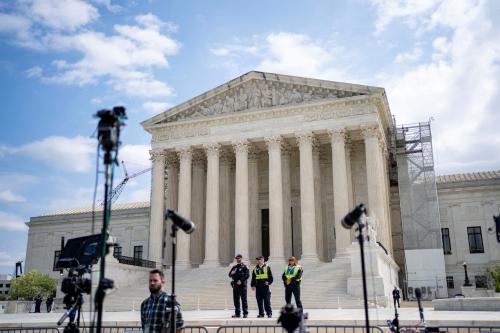

LIVE
Emerging technologies and geopolitical divides: The transformation of the US-Japan alliancePaul Light, Vice President and Director of the Governmental Studies program at the Brookings Institution, testified before the House Committee on Government Reform today, telling panel members that “in this moment of heightened public confidence in government, the presidential gifts process offers the potential for staggering embarrassment and diminished accountability.”
Americans are deeply cynical of the presidential gift-giving process, according to a new study cited by Light, conducted by the Brookings Institution’s Center for Public Service. Sixty-three percent of Americans believe that presidential gifts are given in an attempt to win favor or influence decisions. Twenty-one percent think that presidential gifts are offered in appreciation of a president’s work.
When asked how expensive a presidential gift must be in order to win favor or influence decisions, Americans are torn. Forty-five percent said more than $1,000, and 31 percent said less than $1,000.
Light, an expert on the executive branch and government reform, characterizes reform of the current system of presidential gifts as essential to maintaining public trust in democratic institutions.
“Despite a surge in confidence in all political institutions following the tragedies of September 11, Americans remain highly skeptical about the basic motivations of their leaders and institutions,” Light said in his prepared testimony. “At best, the current system of presidential gifting encourages Americans to believe the worst about their leaders. At worst, it creates the appearance that gifts are not gifts at all, but rather down payments.”
Additionally, Light reported that public confidence in members of Congress, presidential appointees, and federal employees appears to be in decline since the Center for Public Service’s last measurement. “Enron, the recession, and bickering about the stimulus package appear to be taking their toll on confidence,” Light said. “We may be about to witness the greatest squandering of public confidence since Vietnam and Watergate.”
Light noted that favorability toward members of Congress had fallen 10 percentage points, from 71 percent in October to 61 percent last weekend, while favorability toward presidential appointees had fallen from 79 percent in October to 68 percent. Favorability towards federal government workers suffered a similar decline, dropping from 76 percent in October to 67 percent.
Light testified before the House Committee on Government Reform in support of H.R. 1081, which proposes reforming the current process for logging, valuing, and managing gifts to the president. Light endorses H.R. 1081 and its efforts to make available and accessible the specifics of presidential gift-giving; in particular, who is giving, what they are giving and the value of their gift. In the public opinion poll he cited, 1,090 Americans were surveyed on behalf of the Brookings Institution’s Center for Public Service by Princeton Survey Research.

William A. Galston
May 1, 2024

Elaine Kamarck, Jordan Muchnick
April 26, 2024

Richard Lempert
April 24, 2024